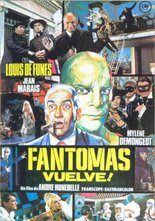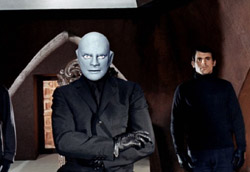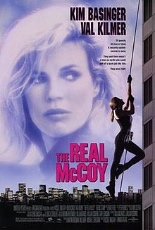
 Picking up one year after the events of Fantomas, the sequel Fantomas Unleashed opens with the bumbling Commissioner Juve (Louis de Funès) being named a Knight in the Legion of Honor for ridding France of that masked master criminal Fantomas (Jean Marais) … uh, even though he didn’t. Fantomas just went on hiatus, but he’s back to embarrass the blood-boiling Juve and announce his intent to “perfect a ghastly weapon. … Soon, I will be the master of the world.”
Picking up one year after the events of Fantomas, the sequel Fantomas Unleashed opens with the bumbling Commissioner Juve (Louis de Funès) being named a Knight in the Legion of Honor for ridding France of that masked master criminal Fantomas (Jean Marais) … uh, even though he didn’t. Fantomas just went on hiatus, but he’s back to embarrass the blood-boiling Juve and announce his intent to “perfect a ghastly weapon. … Soon, I will be the master of the world.”
Said game changer is a mind-control ray, and all Fantomas lacks is the participation of both the scientists who have been developing it. Having abducted one already, he sets his sights on kidnapping the elderly Professor Lefèvre (also Marais) at the International Scientific Conference; hero journalist Fandor (Marais once more) offers to take the learned man’s place by disguising himself as the bald, bulb-nosed prof. It’d be a mistake for Unleashed to ignore a ripe opportunity for mistaken identity — and then some! — so it doesn’t.
 “These days, it’s all secret agents and gadgets,” says Juve — a bit of self-reflexiveness, as returning director André Hunebelle doubles down on the 007 influence, packing the picture with more gadgetry and accoutrements than before. While Fantomas has acquired a remote-controlled mini-car and submerged-volcano lair, Juve makes use of a third-arm contraption and bullet-firing cigars. These items of spy-fi work in support of the cartoon opening credits to cue viewers in on how seriously not to take the next hour and a half.
“These days, it’s all secret agents and gadgets,” says Juve — a bit of self-reflexiveness, as returning director André Hunebelle doubles down on the 007 influence, packing the picture with more gadgetry and accoutrements than before. While Fantomas has acquired a remote-controlled mini-car and submerged-volcano lair, Juve makes use of a third-arm contraption and bullet-firing cigars. These items of spy-fi work in support of the cartoon opening credits to cue viewers in on how seriously not to take the next hour and a half.
Front and center in the first Fantomas, Fandor yields the spotlight to Juve this time, likely because the commissioner’s brand of comic relief — so hot-tempered, he’s a walking ad for beta blockers — works in harmony with the light tone. Back as Fandor’s fiancée, Mylène Demongeot enjoys an elevated role as her character more actively participates in the caper and gains a precocious little brother (Olivier de Funès, son of Louis, in his film debut). Whatever the ratio, the group not only continues to charm, but charms more, and Unleashed is the better movie for it. —Rod Lott









 Help — and eventual trouble — arrives in Beau Hunter (Anthony James,
Help — and eventual trouble — arrives in Beau Hunter (Anthony James,